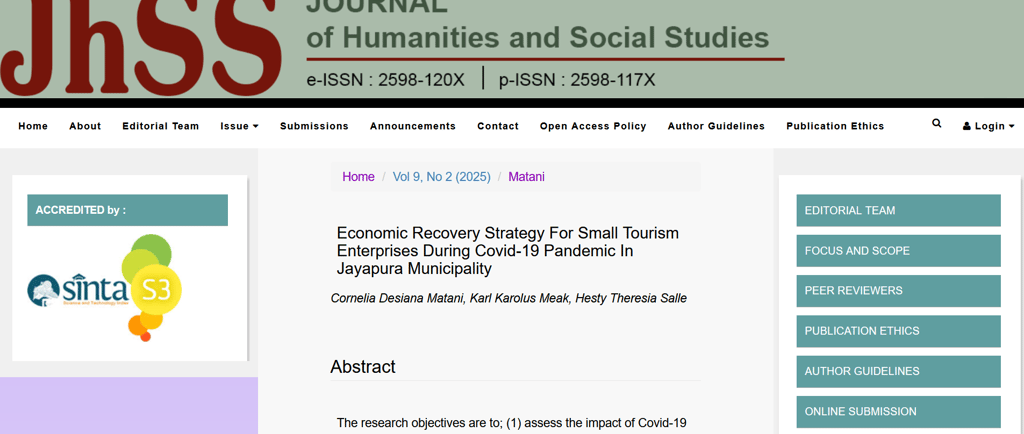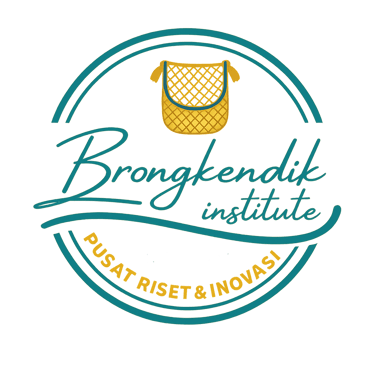Economic Recovery Strategy For Small Tourism Enterprises During Covid-19 Pandemic In Jayapura Municipality
Penelitian ini merupakan penelitian tahun ketiga dalam melihat upaya dan respon dari pemerintah daerah dalam kebijakan dan penggunaan anggaran selama pandemi Covid-19 di Provinsi Papua. Tujuan penelitian ini yaitu; (1) mengkaji sejauh mana dampak Covid-19 terdampak pada usaha kecil dan menengah yang bergerak di sektor pariwisata dan resistensinya selama masa pandemi; (2) menguraikan sejauh mana intervensi yang dilakukan oleh pemerintah dalam mendukung usaha kecil dan menengah selama pandemi berlangsung; (3) mengkaji sejauh mana kebijakan dan program pemerintah dalam rangka pemulihan ekonomi usaha kecil dan menengah dan memberikan rekomendasi solusi dalam rangka pemulihan kelompok usaha kecil dan menengah. (4) Strategi apa yang dibutuhkan untuk memulihkan kembali usaha kecil yang terdampak agar dapat kembali survive. Metode yang digunakan metode deskriptif kualitatif dan content analysis. Penelitian ini difokuskan pada pelaku usaha kecil dan menengah disepanjang spot wisata Pantai Hamadi sampai pantai Holtekamp, Kota Jayapura.
Cornelia Desiana Matani, Karl Karoluz Wagab Meak & Hesty Theresia Salle
7/14/20251 min baca


Abstract: The research objectives are to; (1) assess the impact of Covid-19 on tourism small and medium-scale enterprises and their resistance; (2) outline the government intervention supporting small and medium enterprises; (3) examine local government programs for small and medium enterprises economic recovery and provide recommendations (4) identify strategies to recover businesses. The method used was descriptive qualitative and a content analysis. This research focused on small and medium-scale enterprises (SMSE) in tourism site from Hamadi to Holtekamp beach, Jayapura Municipality.The identification of income from the nine SMSEs studied found that only three SMSEs experienced a significant impact from the Covid-19 pandemic. In addition, from the workforce aspect, five SMSEs experienced a reduction in workforce during the Covid-19 period. In terms of visitor trends, Six SMSEs encountered the impact of the pandemic. Regarding the government policy intervention, there were budgets allocated for the prevention of Covid-19 in the SMSE sector, namely, Unexpected Expenditures Budget as well as Grant Budget with total of Rp. 7,314,685,000 which was realized at only Rp. 3,078,448,925 or 42.09%. In addition, the SMSE business managers viewed that the designed policies, program and activities were not precise for them. This research proposes some strategies: (1) providing assistance to increase SMSE resistance during the pandemic; (2) encouraging collaboration between government and business actors to improve business innovation which will increase SMSE business capacity (3) maximizing the use of digital platforms. As this research only relied on the perspectives of business owners and on regulations as well as government financial report documents, it is suggested that further research using various empirical data can be conducted, hence the factors determining the economic recovery strategy among SMSE can be more persistent. This study contributed to identification of SMSE strategy to sustain the business during covid-19 in eastern part of Indonesia.
Sumber publikasi penelitian: https://journal.unpak.ac.id/index.php/jhss/article/view/11902
